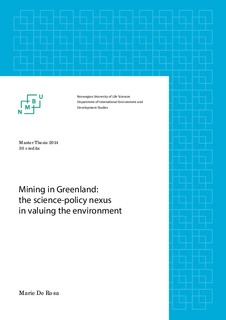| dc.description.abstract | Ever since Greenland achieved self-rule from Denmark in 2009, the country has actively
promoted its mineral wealth on the international stage and investors from all around the world have opened their eyes to this vast Arctic island. As the ice sheets are melting, the question of how the government ought to balance the need for economic growth against the need to protect the county’s vulnerable ecosystems is becoming increasingly important.
The purpose of this thesis is to study in what way the government of Greenland has valued the environment when granting licenses on mining operations from the 1st of January 2009 until the 1st of April 2014. I have performed a content analysis of the previous and present government’s mineral strategies, consultation memorandums and expert assessments of mining activities as well as academic literature in order to analyse how state and non-state stakeholders value ecosystem services and landscape values vis-à-vis economic gains. I have furthermore considered how expert and non-expert knowledge about the environmental effects of mining informs decision-making on mining operations, and which actors are included or excluded from the policy processes. I have linked the issue of mining to the larger Greenlandic context and placed it within the frames of the concepts of sustainable development and sacrifice zones.
I found that the government attaches importance to both the intrinsic and the instrumental
value of nature, but also that “expert” assessments of the environmental consequences of
mining projects consistently downplay the negative effects of the project in question. The
knowledge informing decision-making on the extraction of valuable minerals is mainly
produced by a limited set of scientific institutions, and on several occasions the government has disregarded alternative interpretations of a mining project’s environmental effects presented by citizens or civil society groups. Using the lifting of the zero-tolerance policy as an example, the government has failed to recognise the need to incorporate different types of knowledge when assessing new and modernised types of risk. Finally, I have identified a range of flaws connected to the present participatory process in Greenland, including the apparent lack of dialogue between local residents, government representatives and the mining companies. I argue that there is a need to establish new and participatory forums where ordinary citizens, scientific experts and decision-makers can come together and discuss what the country wishes to achieve with its mineral sector and what value it should place on protecting the environment versus stimulating the economy. | nb_NO |
